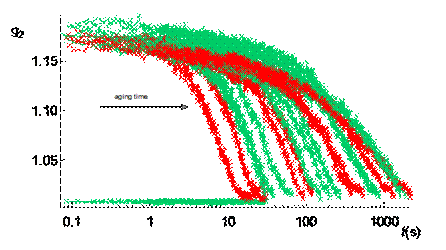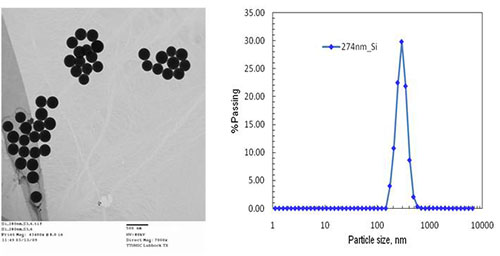Study of Colloidal Materials
Study of Aging in Colloidal Glass-formers
We are involved in collaborative studies on the structural and rheological studies of colloids on crossing the glass transition concentration. We take the alpha relaxation time of colloids obtained in multi-speckle diffusive wave spectroscopy (DWS) as a measure of structure and keep track of it as a function of aging time. In collaboration with Tetsuharu Narita and Francois Lequeux of ESPCI, Paris, France, we have built a DWS system at Texas Tech. The figure is the evolution of the intensity auto-correlation function as the aging time increases showing that the characteristic time increases with aging time. One of the questions we would like to answer is how far one can push the analogy between conventional glass formers like polymers and colloidal glasses.

The experiments we perform involve changing the colloidal concentration rapidly similar to changing temperature in a molecular glass and to that end we are using two different techniques. In the first technique, we use thermosensitive polymer particles suspended in water. By changing temperature, we effectively change its concentration which is analogous to the temperature in conventional glass formers. The figure shows the aging response of such a thermosensitive particle suspension after a temperature down-jump that corresponds to a concentration change from below to above the glass concentration; more complicated history are been performed as well. These particles are synthesized for us by Srinivas Pullela and Zhengdong Cheng at Texas A&M University. We have also built a high pressure light scattering cell to change the concentration of silica suspension by applying pressure. Results are anticipated to provide fundamental information related to the glass transition event.
Funding
- Vice President for Research at Texas Tech University
- The John R. Bradford Endowment at Texas Tech
Nonlinear Rheology of Colloidal Suspensions
The rheological properties of colloidal suspensions were studied with an Advanced Rheometric Expansion System (ARES). We are investigating the dynamic responses of Si nanoparticles in ionic liquids. Linear and nonlinear rheological properties as a function of particle concentration and size are being investigated.
Synthesis
Spherical silica nanoparticles were synthesized in our laboratory from aqueous alcohol solutions of silicon alkoxides in the presence of ammonia as a catalyst by using sol-gel process.

Figure 1 (left): 280 nm diameter SiO2 particle as imaged by TEM
Figure 2 (right): Particle size distribution from dynamic light scattering of the same SiO2 particle as shown in Figure 1.
Funding
- Petroleum Research Fund
Polymers and Condensed Matter Physics Group
-
Address
P.O. Box 43121, Lubbock, TX 79409−3121 -
Phone
806.742.3553 -
Email
che@ttu.edu
